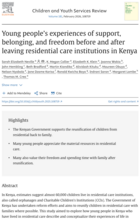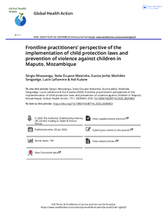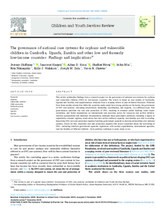Displaying 1 - 10 of 1625
The Early Childhood Development Action Network (ECDAN), together with the Government of Rwanda, UNESCO, UNICEF, WHO, and the Africa Early Childhood Network (AfECN), is hosting Investing in the Early Years: A Global
In Kenya, young people’s experiences of residential care and life after leaving care highlight trade-offs between material support, emotional guidance, and personal freedom. The study emphasizes that family strengthening and individualized case management are crucial to support children reunifying with families and successfully transitioning out of residential care.
The KUOW article explores a striking reduction in the number of children in southern Uganda who have lost a parent, dropping from nearly one in four in the early 2000s to just 6% by 2022, and links this trend to global HIV treatment efforts.
This article examines how frontline child protection practitioners in Maputo City, Mozambique experience the implementation and enforcement of child protection laws, focusing on perceived barriers and facilitators. It finds that resource constraints, legal gaps, and sociocultural norms hinder effective enforcement, while NGO support and multisectoral coordination act as key enablers, highlighting the need for increased funding, legal harmonization, and evidence-based interventions to prevent violence against children.
This article examines how national care systems for orphans and vulnerable children in Cambodia, Uganda, and Zambia are governed, drawing on case studies and a review of existing research. It highlights the gap between strong policy commitments and weak on-the-ground implementation, pointing to historical, political, and capacity-related factors that hinder effective care and protection.
A 14-year-old orphan, Saabirin Saylaan, was murdered by Hodan Mohamud Diiriye, the woman caring for her, after enduring months of severe abuse, prompting national outrage and protests in Galkayo.
This article argues that visiting orphanages in Kenya during holidays or as part of voluntourism, while seemingly charitable, can actually harm children by perpetuating a system that values short‑term attention over stable, family‑based care and s
This article reports how the Tanzanian government has committed to strengthening alternative care services and the management of children’s homes nationwide to ensure they meet required standards and better support child welfare and protection.
This blog, from Hope and Homes for Children, argues that the new Netflix documentary Masaka Kids: A Rhythm Within—produced with the involvement of Harry and Meghan and set in a Ugandan orphanage—presents a superficially heartwarming story that risks reinforcing harmful perceptions about institutional care at a time when global leaders, including the UK, are advocating for family-based care and ending orphanages.
This video highlights the rise of a locally led movement in Ethiopia, where Christian leaders and organizations are transforming child welfare practices following the end of intercountry adoption. It showcases the impact of the CAFO-supported DEBO Alliance as churches and advocates embrace domestic adoption and best practices to bring hope and lasting care to vulnerable children and families.



